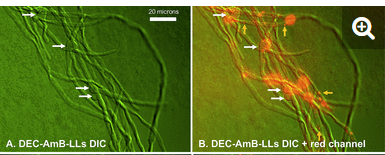
Dectin-1 is a mammalian innate immune receptor in the membrane of some leukocytes that binds as a dimer to beta-glucans found in fungal cell walls, signaling fungal infection. A recent published study developed a Dectin-1 targeted liposomes which can specifically bind to fungal cell walls. The targeted liposomes were used to deliver amphotericin B (AmB). Using a novel protocol, the researcher coated AmBLLs with Dectin-1’s beta-glucan binding domain to make DEC-AmB-LLs. DEC-AmBLLs bound rapidly, efficiently, and with great strength to Aspergillus fumigatus and to Candida albicans and Cryptococcus neoformans, highly divergent fungal pathogens of global importance. In contrast, untargeted AmB-LLs and bovine serum albumin (BSA)-coated BSA-AmB-LLs showed 200-fold-lower affinity for fungal cells. DEC-AmBLLs reduced the growth and viability of A. fumigatus an order of magnitude more efficiently than untargeted control liposomes delivering the same concentrations of AmB, in essence decreasing the effective dose of AmB. Future efforts will focus on examining pan-antifungal targeted liposomal drugs in animal models of disease. American Society for Microbiology 2019 (4) Issue 1 e00025-19.
